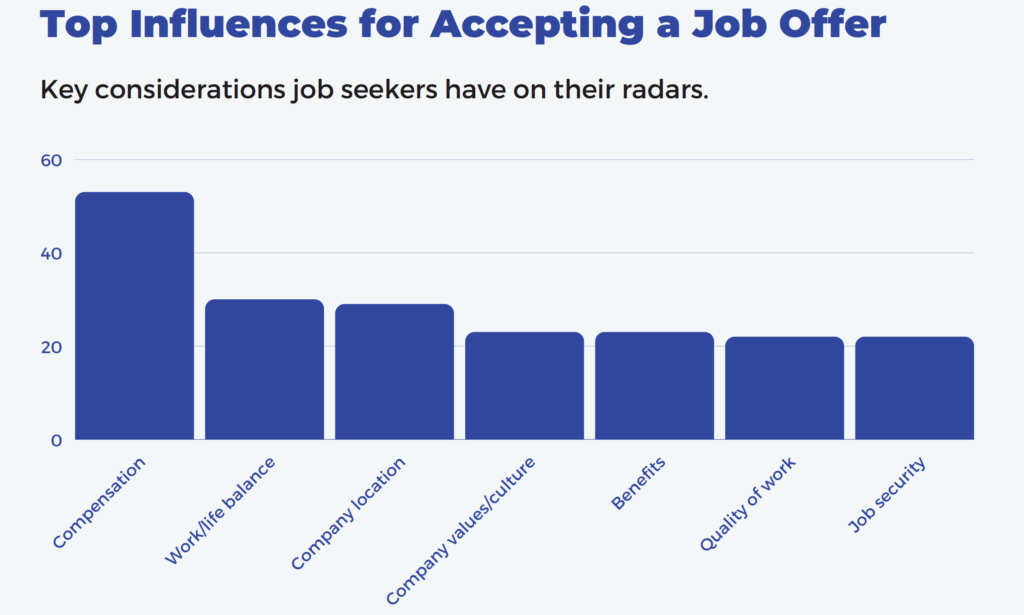The seismic shift during the last two years has turned the labor market on its head. Candidates are firmly in control of the hiring process and employers have been left scrambling to respond to demands for higher compensation, an improved work/life balance, and focus on overall company values and culture, according to the 2022 Job Seeker Nation Report.
With millions of available jobs and talent seeking roles that better align with their own requirements, today’s job seekers are leveraging their upper hand to secure new jobs, higher wages, and better benefits. Simply, workers are making it clear they want more from employers — and they feel empowered to ask for it.
So what can organizations do to improve their ability to attract and hire top talent? The answer lies with the candidate experience. Let’s take a look at what the candidate experience entails and then dive into four pieces of data that will inspire your organization to improve the experience for candidates from first look to first day.
What Is the Candidate Experience?
Candidate experience includes feelings, impressions, interactions, and activities a job seeker encounters and considers along their candidate journey. It’s how a job seeker feels they’ve been treated throughout the recruitment process, and how that treatment makes them feel about the employer. Whether positive or negative, they all contribute to the candidate experience.
The candidate experience can include:
- Your job advertisements
- Your company website or job listings
- Responding to your job board postings or advertisements
- The ease and requirements of the application process
- Communication from you, your team or your recruitment technology
- Your interview process, whether in-person or via video conference
- Notifications about the candidate’s application status
- Ongoing communication with your HR team, department managers, etc.
- Candidate rejection letter or job offer
Candidate experience is really a reflection on the recruiting team and the company they represent. Unfortunately, as research by Talent Board reveals, only one in four job seekers rate their candidate experience as having been “great.”
At its core, candidate experience should be focused on creating positive feelings and impressions in job seekers. Whether it’s making them feel welcomed and valued during the application process, providing helpful feedback or communication throughout the recruitment process, or treating them with professionalism and respect after their candidacy has ended, candidate experience encompasses every interaction a candidate has with an employer.
And while negative candidate experiences are often easy to spot — such as long wait times for responses, inconsistent communication or even outright rudeness — it’s important to recognize how even positive interactions can have a significant impact on how job seekers feel about your company — and whether they want to pursue future opportunities there.
What the Latest Data Is Telling Employers
#1: The Labor Market Favors Candidates
According to the U.S. Bureau of Labor Statistics, on the last business day in March 2022, there were 11.5 million job openings, the highest ever recorded in history. But during the same time period, the number of hires was just 6.7 million. Factor in that more than 4.5 million workers quit their jobs, and the gap seems even more difficult to overcome. Organizations in the retail sector and durable goods manufacturing each added jobs, making it even more important to ensure focus is placed on finding candidates quickly for high-volume roles and for skilled labor. Clearly, as the scale tips toward job seekers in the hiring market, organizations of all sizes must be aware of the macro trends at play. Employers coming to terms with these changing dynamics are having to re-examine how they treat candidates and nurture them throughout the hiring process.
#2: Worker Confidence Is At an All-Time High
Right now, workers are extremely confident they can easily find new jobs and are not looking at their current organization for new openings. The 2022 Job Seeker Nation Report indicates that 45% of surveyed workers are actively looking for a new job or plan to within the next year and more than one in two believe it’s easier to find a job this year than in the previous year. Further, one in three workers feel comfortable quitting their job now without having another job lined up. Companies must double-down on the candidate experience, ensuring they are highly responsive, communicative, and make fast hiring decisions on talent.
#3: Candidates Want a Great Hiring Experience
When it comes to creating a positive candidate experience, job seekers are particular. They are looking for easy to schedule interviews (52%), a fast application process (51%), outstanding communication, feedback, and prompt follow-ups (47%), personal conversations during the interview (34%), and a great explanation of company values, vision, mission and culture (23%), based on the latest Job Seeker Nation Report. While it may seem basic, getting these foundational items correct is the cornerstone of creating an experience that candidates will not only remember, but also favor. And that means your company will be more competitive in hiring talent in a difficult market.
#4: Job Seekers Have Specific Demands in Accepting Job Offers
The ultimate goal of building a positive candidate experience is to nurture job seekers throughout the recruiting process and to get them to the offer and acceptance stage. But what are candidates really expecting when it comes to accepting an offer? The latest data provide insight into areas that most influence candidate likelihood of accepting an offer. Specifically, the Job Seeker Nation Report reveals that 53% of candidates this year are looking for overall compensation as their top factor in accepting a new position. This is followed by work/life balance (30%), company location (29%), company values and culture (23%), healthcare and other benefits (23%), quality of work (22%), and job security (22%).
Time to Refocus on the Candidate Experience
Now that you’ve had a chance to take in some of the latest insights and data on the candidate experience, take time to rethink how you are approaching the talent journey for candidates in your organization. Have compassion for job seekers, and remember, the job search can be a frustrating and stressful experience, particularly when employers are non-responsive.
Prioritize using recruiting automation to enhance your hiring efforts. Above all, make sure you regard the candidate experience holistically. Recognize that each touchpoint contributes to how candidates perceive your organization — and in turn — how you show candidates you value them.
Stay current on the latest trends in talent today when you subscribe to our blog. Or check out our resource library to find more tools that will help you build a more nurturing and supportive candidate experience.






